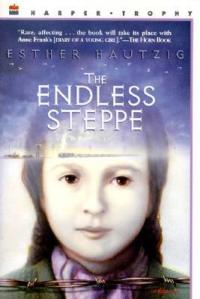 This is one of those books that I’ve always been aware of without really knowing what it was about. I remember seeing it on library shelves when I was a kid, and never bothering to give it a closer look because, well, let’s face it, “The Endless Steppe” doesn’t sound very appealing, does it? In fact, the only reason I’m reviewing it now is because my daughter recently read it in her seventh grade English class and she was quite insistent that I should read it too.
This is one of those books that I’ve always been aware of without really knowing what it was about. I remember seeing it on library shelves when I was a kid, and never bothering to give it a closer look because, well, let’s face it, “The Endless Steppe” doesn’t sound very appealing, does it? In fact, the only reason I’m reviewing it now is because my daughter recently read it in her seventh grade English class and she was quite insistent that I should read it too.
I’m glad I did. Despite the *yawn* title, this book was extremely engaging and very moving too. It’s nonfiction — a memoir of the author’s childhood spent exiled in Siberia during WWII. Polish Jews, and “enemies of the state,” Esther and her parents endured five years of extreme hardship and deprivation in a hard labor camp. At the same time, Esther also endured the universal adolescent hardships of trying to fit in and make friends with strange kids, having her first crush, testing her independence, yearning for fancy clothes, etc.
The Endless Steppe is probably just right for a seventh grade English class. The family’s suffering is the main theme of the book, but it is not nightmarish. I don’t think my daughter is quite ready for Anne Frank, but she will be in a year or two, and this book will pave the way. It offers much to discuss, including characters such as a gentle guard; a pathetic thief; a mean teacher; and a vagabond with a heart of gold. No punches are pulled in these emotionally complex situations.
It’s a little harder to evaluate this book from an adult perspective. I don’t read much YA — only when my daughter makes me — because frankly I am no longer interested in teen angst. I have my own teenagers to deal with and that’s enough, thanks. But for the most part I found this book satisfying, particularly because of the author’s brutal honesty. She may have written it years after the fact, but the voice is an authentic girl’s. Here is another bit of emotional complexity — my favorite passage:
Mrs. Kaftal wondered why we could not have been told to prepare ourselves for Siberia, everyone would have been so much more comfortable, wouldn’t they? with their nice fur coats? and their good boots? what harm would it have done anyone? Karl, who rarely spoke, told his mother to shut up so sharply that we all felt the sting.
My shoes seemed exceptionally tight and flimsy that morning. But as soon as Mother and Father had gone, I went outside. The snow might be light, but it had completely covered the steppe. Now, at last, this was Siberia.
It was at this moment that I fell in love with space, endless space. And since Siberia was space, I had to include it — just a little and with great guilt — in this love.